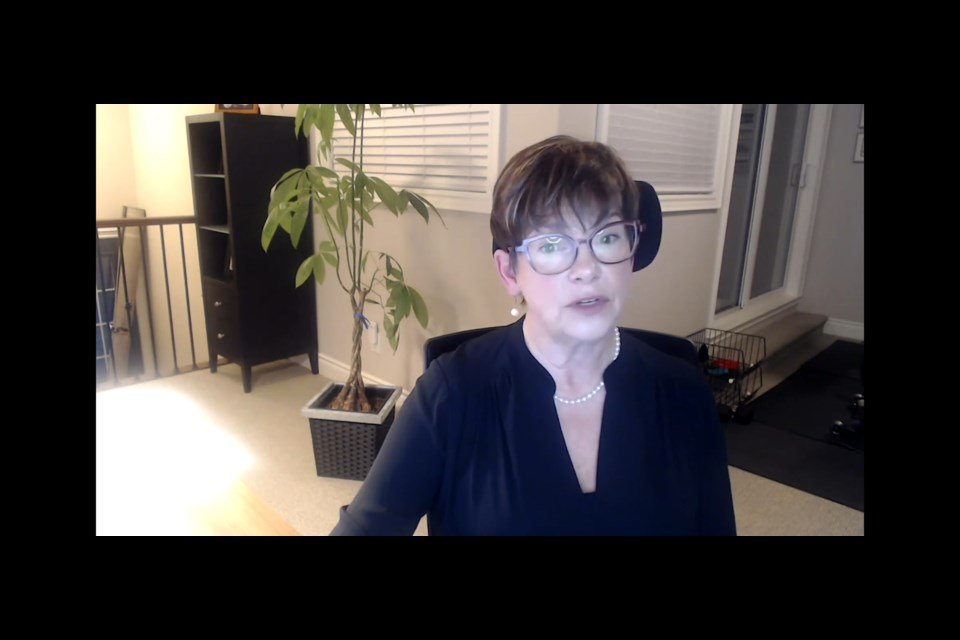A video town hall call held Thursday night was an attempt to bring all of the players together to provide an update and inform the community on the region’s battle against COVID-19.
The online chat, hosted by Royal Victoria Regional Health Centre (RVH), included representatives from several organizations that have been at the forefront of the pandemic, including the Simcoe Muskoka District Health Unit, the Barrie Police Service, the City of Barrie, and the Canadian Mental Health Association's Simcoe County branch.
Dr. Charles Gardner, Simcoe-Muskoka's medical officer of health, talked about how trying the second wave has been for the community.
“It's been the end of a difficult time for us. We have come through five months of increasing cases and, really, the second wave has been much harder on us than the first wave," Gardner said.
Gardner told the panel there had been 101 deaths in the region as of Thursday night, and approximately 10 times the amount of cases in the second wave than there had been in the first.
Despite the incident level being lower than the provincial average, Gardner said the numbers are still too high, particularly in the lower portion of the region where “certainly Barrie would be in keeping with that.”
There have been 12 institutional outbreaks recently, including three hospitals, long-term care facilities, retirement homes, and a correctional facility.
“Clearly, (COVID-19) has had a major impact on the well-being of the people of Simcoe-Muskoka,” said Gardner.
RVH president and CEO Janice Skot said that the main focus is to get as many needles into arms as possible.
“Our primary focus remains to be long-term care and high-risk retirement homes. They are the most vulnerable and most at risk,” she said.
Skot said it was equally as important to immunize as many workers as they could, to keep those people safe who are tending to others who need help most.
News came last week that a factory expansion at COVID vaccine supplier Pfizer's Belgium plant was going to slow production, cutting Canada's deliveries over four weeks in half.
In exchange, Pfizer expects to be able to ship hundreds of millions more doses worldwide over the rest of 2021.
Despite that bad news, Skot said RVH would continue to find ways to work around the ever-changing pandemic landscape.
“It was very discouraging news that the Pfizer production had slowed down and therefore the supply of the vaccine would become significantly less,” Skot said. “But we are able to pivot almost every day as we try to develop a plan that best meets the needs of the most vulnerable.”
Skot was asked what she thought about the announcement that, by February, all of Ontario’s intensive care units (ICUs) could be full.
“Currently, we have 37 positive patients, which brings the total since the start of the pandemic to 174,” Skot said. “To date, unlike the Toronto area, we have been relatively fortunate to not see the soaring numbers of COVID patients in our region.
"But those numbers are steadily increasing," she added.
In order to assist the highly affected Greater Toronto Area, Skot said RVH has accepted 84 transferred patients from 21 Toronto-area hospitals. She expects to accept an additional 30 patients this week alone.
“We’re all in this together and are pleased to support our partners. In fact, RVH’s mobile response team has supported 21 long-term care homes in our community through infection control, testing and other support," Skot said.
Barrie Mayor Jeff Lehman talked about the effects the pandemic is having on citizens.
"People are very, very tired, very fatigued,” he said. "It has been 11 months and, as Dr. Gardner said regarding the last five months of the second wave, there have been increasing levels of restrictions. There are preliminary numbers to suggest this may be working, but it is too early to tell and certainly too early to tell when we might be able to go back.”
Lehman said he was particularly impressed with Barrie residents for how they have found ways to be there for each other, and to do it safely.
“The response from individual residents — to get into online groups and start helping one another out — has been just remarkable,” said Lehman.
Lehman cited the Facebook group Barrie Families Unite as having 12,000 members and how it started at the beginning of the pandemic to help with the transfer of needs and services from resident to resident.
“If we were talking two or three months ago, I would probably be bragging about Barrie’s economic performance. Through September, we led the entire country in our job situation and saw a net year over year increase in the number of jobs in Barrie,” said Lehman. “That has changed and we are now seeing a very severe impact, as are all cities.”
Lehman said he agreed with small business owners who were upset about big box stores who have been allowed to sell the same product as they are while they are forced to remain closed.
The mayor called it “fundamentally unfair” and believes higher levels of government have realized that with the many grants being available to small businesses.
Canadian Mental Health Association chief executive officer Dr. Valerie Grdisa spoke about how the pandemic has exposed another crisis, in the sense that staying at home for prolonged periods of time has negative for some people.
“The COVID-19 pandemic has revealed what we call a 'shadow pandemic'. An alarming increase of child abuse, neglect and violence against women,” said Grdisa. “It appears that one in five Canadians turn to substance abuse as a way to cope. That includes alcohol, cannabis and other substances. We have also seen an increase in substance related emergency room use and opioid-related overdoses the past year in our community.”
Grdisa reminds everyone who is having trouble coping that there are several numbers and sites they can reach out to that deal with mental health and addiction services in the community.



